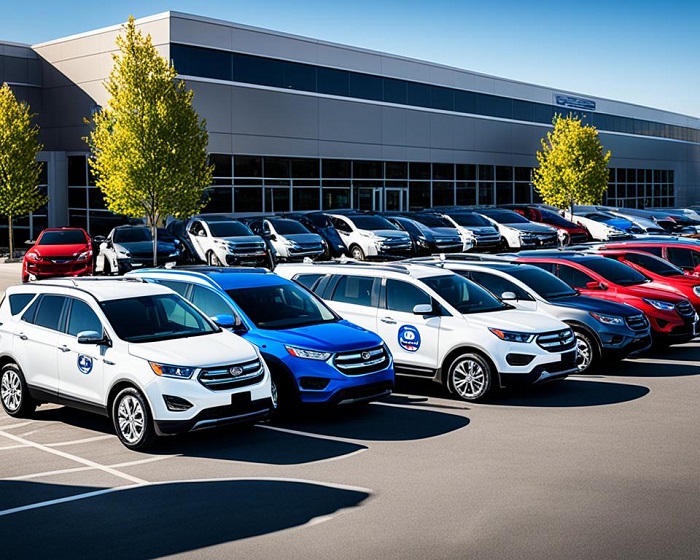Finding the Cheapest HGV Insurance | Expert Guide
For many fleet owners in the UK, securing affordable cover for Heavy Goods Vehicles (HGVs) is essential yet challenging. In this expert guide, we'll delve deep into the strategies and knowledge necessary to find cheap HGV insurance. From comprehending the basics of HGV insurance to uncovering additional avenues for reducing your premiums, this guide aims to provide you with actionable insights to achieve low-cost policy options without compromising on coverage.
Understanding the various factors that impact insurance costs is pivotal. By arming yourself with the right information, you can negotiate better rates and identify the insurance products that align perfectly with your fleet's budget and risk profile. Whether you are a seasoned business owner or new to fleet management, this guide offers valuable tips that will help navigate the complexities of HGV insurance and secure economical solutions that protect your investment and keep your operations running smoothly.
Key Takeaways
- Explore the essentials of HGV insurance to better understand policy options.
- Learn how to strategically secure affordable cover for your fleet.
- Identify the factors that influence cheap HGV insurance rates to make informed decisions.
- Discover additional methods to reduce premiums while maintaining ample coverage.
- Incorporate tips to negotiate and find the low-cost policy that aligns with your business needs.
- Benefit from expert insights tailored to help UK HGV fleet owners save money.
Understanding HGV Insurance Basics
Grasping the fundamentals of HGV insurance coverage is crucial for any commercial vehicle operator. This coverage ensures protection from various liabilities and risks associated with operating heavy goods vehicles (HGVs). In this section, we dive into the various policy types available and the essential insurance requirements mandated in the UK to keep your business compliant and secure.
https://www.youtube.com/watch?v=wx3QRchvPd4
Different policy types serve different needs, ranging from comprehensive policies to more specific ones like third-party, fire and theft, and third-party only. Here’s a concise explanation of each:
- Comprehensive: This policy type offers the most extensive coverage, protecting against damages to your own vehicle as well as claims made by third parties.
- Third-Party, Fire and Theft: Besides covering third-party claims, this insurance also covers damage from fire and theft of your HGV.
- Third-Party Only: This is the minimum legal requirement and covers damages or injuries that your vehicle causes to other parties or their property.
Meeting legal insurance requirements is not just a regulatory formality but a vital aspect of safeguarding your assets and business reputation. Below is a table detailing the basic legal insurance requirements for HGVs in the UK:
| Type of Coverage | Legal Requirement | Additional Benefits |
|---|---|---|
| Third-Party Only | Mandatory | Covers claims by third parties for injury or damage |
| Third-Party, Fire and Theft | Optional | All benefits of Third-Party plus cover for fire damage or theft of your vehicle |
| Comprehensive | Optional | Covers all of the above plus damages to your own vehicle |
Understanding the coverage options and mandatory insurance requirements will guide you in selecting the right and cheapest hgv insurance coverage for your fleet, ensuring full legal compliance and financial protection against a host of potential risks on the roads.
Factors Influencing HGV Insurance Costs
Understanding the determinants of HGV insurance pricing is crucial for any fleet operator. The vehicle type and size, driver history, age, goods carried, and operating radius are particularly significant in how underwriters assess risk and set premiums. Let's delve into each of these aspects to see how they affect your insurance costs.
Vehicle Type and Size
The type and size of a vehicle play a pivotal role in insurance evaluations. Larger vehicles often entail higher premiums due to the increased potential damage they can inflict in an accident. Similarly, specialized vehicles such as tankers or refrigerated trucks can be more expensive to insure owing to the added risks associated with their cargoes.
Driver History and Age
Insurers consider the driver's history and age as indicators of risk. Experienced drivers with clean records usually benefit from lower premiums. In contrast, younger drivers or those with points on their licenses might face higher costs due to a perceived increase in risk liability.
Goods Carried and Operating Radius
The nature of the goods transported and the vehicle's operating radius also influence insurance costs. Transporting hazardous materials or operating across international borders can significantly increase premiums. Conversely, local operations with less risky goods typically enjoy more favorable rates.
| Factor | Impact on Insurance Cost |
|---|---|
| Vehicle Size | Large vehicles typically incur higher premiums. |
| Driver Age | Younger drivers often face higher rates. |
| Type of Goods Carried | Hazardous materials lead to increased premiums. |
| Operating Radius | Larger radius increases risk and premiums. |
By comprehending how each factor affects your premiums, you can take informed steps to potentially mitigate these costs. For instance, selecting routes that minimize risk or investing in driver training programs might help reduce your HGV insurance expenses.
Tips to Secure the Cheapest HGV Insurance
As you navigate the complexities of HGV insurance, employing strategic approaches can lead to significant savings without compromising on coverage quality. Here, we delve into practical methods to reduce your premiums while maintaining optimal insurance benefits for your business.
Comparing Insurance Quotes
To ensure you receive the best rates available, it's crucial to compare insurance quotes from a variety of insurance providers. This process allows you to see a range of prices and coverage options tailored specifically to the needs of your fleet, helping you make an informed decision that aligns with your financial and operational objectives.
Increasing Voluntary Excess
One effective way to lower your insurance premiums is to increase voluntary excess. This adjustment means you agree to pay a larger part of any claim from your own pocket before the insurance kicks in. While this can decrease your regular payments, it's important to balance the excess so that it remains affordable in case of a claim.
Implementing Fleet Management Practices
Enhancing your fleet management practices can significantly impact the premiums you pay. By adopting advanced safety measures, such as installation of GPS trackers, rigorous driver training programs, and regular vehicle maintenance, you show insurance companies that you are committed to minimizing risks, which can lead to lower insurance costs.
| Strategy | Expected Impact on Insurance Premium | Additional Benefits |
|---|---|---|
| Compare insurance quotes | Can reduce premium costs significantly | Ensures best market rate and coverage |
| Increase voluntary excess | Lowers premiums | Encourages careful fleet management |
| Improve fleet management practices | Lowers risk profile, reducing premiums | Increases safety and operational efficiency |
Cheapest HGV Insurance Options and Cover Levels
As you explore your options for budget-friendly insurance providers, it is crucial to understand not only the cost but also the value you receive. Providers that offer competitive rates for HGV fleet owners without compromising on coverage can significantly reduce your overall expenses. Equally important are the minimum coverage requirements which ensure that your fleet operates both legally and safely within jurisdictional guidelines.
Many budget-friendly insurance providers bundle comprehensive policies that exceed minimum coverage requirements, thereby offering added security against a range of potential incidents. These comprehensive policies typically cover a wide array of damages, including those due to accidents, natural disasters, and theft, providing substantial peace of mind for business owners.
- Assess the coverage needs: Ensure that the offered coverage meets or surpasses the mandatory minimum coverage requirements.
- Evaluate provider reputation: Research provider track records to ensure reliable claims service and customer support.
- Consider policy flexibility: Look for providers offering comprehensive policies which can be tailored to fit unique business needs.
Opting for comprehensive policies from reputed, budget-friendly insurance providers not only helps in protecting your assets but also significantly mitigates financial risks associated with vehicular operations.
Ultimately, the choice of HGV insurance should hinge on a balance between cost efficiency and the breadth of coverage. Adequately comparing the offerings on these factors can yield substantial savings while fortifying your fleet against unforeseen costs.
Additional Ways to Save on HGV Insurance
While the basics of finding affordable cover for your heavy goods vehicles are essential, diving deeper into cost-saving strategies can lead to significantly reduced premiums. One effective method is the implementation of telematics devices within your fleet. These advanced devices monitor driving patterns, speeds, and habits, and evidence of responsible driving can influence insurers to offer more favorable terms. Effectively, it turns the data collected into a testament of your fleet's safety commitments.
Moreover, investing in secure parking facilities provides a dual benefit. Not only does it safeguard your vehicles against theft and vandalism, but also it significantly lowers the risk factors insurers consider when setting premiums. Such proactive steps demonstrate to insurance providers that you are taking every possible measure to minimize risks, thereby potentially lowering your insurance costs. Secure facilities are particularly valued in urban areas where the likelihood of vehicle theft is higher.
Another crucial element in controlling insurance expenditures is focusing on driver qualifications. Ensuring that all drivers in your fleet are highly qualified and possess the necessary certifications can be immensely beneficial. Well-trained drivers are less likely to be involved in accidents, leading to fewer claims and consequently, lower insurance costs. Regular training and assessments not only improve safety but also fortify your bargaining position when negotiating insurance rates.
By integrating these techniques—telematics, secure storage, and skilled drivers—you can engage with insurance providers from a position of strength, potentially garnering substantial savings. Each step taken to minimize risk and demonstrate responsibility can help pivot the scale in your favor, making affordable HGV insurance within reach.




Comments
Post a Comment